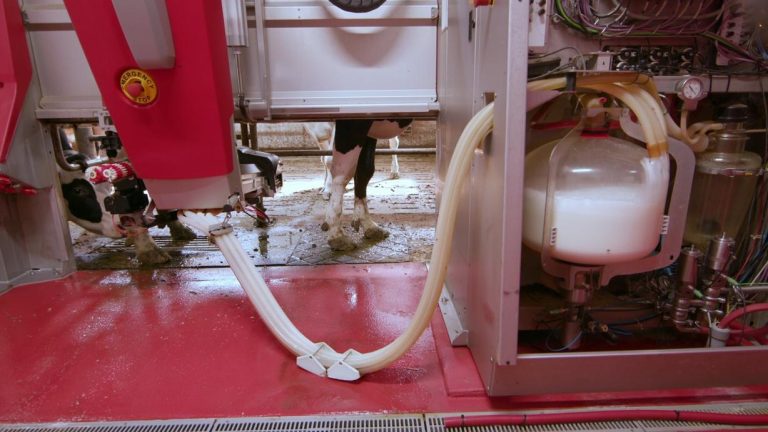Version coming soon.
“Life has changed since then,” said Tina Hinchley, a dairy farmer in Cambridge.
December 2023 marked five years since the Hinchley family moved their herd of around 300 cows to a new barn fitted with automated milking machines.
“It has changed my life, because being able to go in and check only the cows that we need to focus on and not have to focus on each individual cow, has been very beneficial for my physical health, but also for my mental health,” Hinchley said.
In addition to a few part-time student employees, the Hinchleys have only one full-time employee since automating processes such as milking and feeding on their farm.
“Typically, we end up with high school or college students because we're close enough to Madison,” Hinchley said. “But there were times when it was difficult.”
No longer tied to milking cows herself twice a day, Hinchley says she and her dairy cows are happier with the robotic milkers running 24 hours a day.
“It's not necessarily something you have to do to survive in the dairy industry,” said Chuck Nicholson, a professor of animal and dairy sciences at the University of Wisconsin-Madison. He noted that only about 8% of Wisconsin dairy farmers have implemented the new technology, usually family farms that want to save on labor costs.
“The labor shortage is definitely a major motivating factor,” Nicholson said.
The high-tech collars fitted to each cow send about 130 different data points about each animal directly to Hinchley's smartphone.
“There are other benefits that farms gain from adopting these automated milking systems which can include better milk production, increased milk per cow, improved animal health, and improved milk quality,” Nicholson explained.
While many Wisconsin farmers are considering the impact AI could have on their dairy production, Nicholson said 75% of Wisconsin farmers said they have not and will not implement robots on their farms.
“When we built this, I told the people who were designing it and the things I didn't want there to be any moving parts,” said John Rosenau, who runs a herd of 600 cows in Buffalo County.
“It's our kitchen window – I put it there because before, we were hiring local people, and I needed to see the car park,” he explained. “So who didn't show up? And if someone didn't show up, I had to go and cover for them.”
Rosenau struggled to find reliable labor before hiring his first immigrant employee in nearly 25 years.
“Since we hired Mexicans, I don't have to do that anymore. I can live in the city because they're always on time, and they're here on time,” he said.
Rosenau founded the nonprofit Puentes/Bridges, which works to bridge the gap between farmers and their migrant employees by sending them to meet workers' families in Mexico. He says he never thought about robots because of his commitment to these human resources.
“I've seen in Mexico all the different houses and things they've built, and they've educated their kids. They're getting health care, things they couldn't get before,” Rosenau said. “So when I look at both sides — the business side and the humanitarian side — “I lean strongly toward the human side of it.”
Rosenau said the vendors who showed him their technology were smart. He said that they are taking advantage of old farmers and convincing them that they are far from reality.
“A lot of times, when this first started, I would feel bad, ‘Am I a weirdo?’ You know, you ask yourself,” he said.
The Rosenau herd will require about eight robotic milking machines, at a cost of about half a million dollars apiece, as well as a new barn. Modern farm equipment also requires more expensive, specialized labor to make repairs, he said.
“It doesn't matter if it's new or old or whatever, it's going to break,” Rosenau said.
With the volatile nature of the dairy economy, he said old equipment that farmers can repair is better than new equipment that you can't, pointing to his front-end loader.
“This machine cost us $25,000 40 years ago, and if we bought one similar to that now, you'd probably expect $200,000 and then we wouldn't be able to fix it. We'd have to ask the dealer to fix it,” Rosenau said.
For most of 2023, all dairy farmers were losing money, Nicholson said.
“The circumstances we are living in are truly unusual at the moment,” he noted.
That's because for the first time in more than 20 years, the USDA is hearing proposals to tweak the system that determines how milk is priced. This system, called federal milk marketing orders, has no mechanism to adapt to economic or technological changes over time, Nicholson said.
“It is a long and sometimes painful process to achieve this,” he said.
But on Wisconsin farms, producers can't follow the lengthy discussions taking place in Washington.
“We don't know what we're going to get. We have no idea,” Hinchley said. “With the goods we produce, we are on a global scale. We don't know what's going on with China until it happens. We do not know the size of Brazil's production. “All of that impacts our bottom line.”
So, whether by machine or by hand, Wisconsin farmers push to milk their herds.

